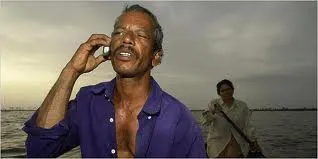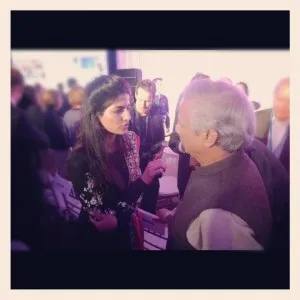m.Paani Designs mLoyalty Program for the Underserved [mSocial Ventures]

This story is the first in the seriesof articles on mobile based innovative solutions in the social sector
780 million people lack access to an improved water source (approximately one in nine people) reads the WHO/UNICEF Joint Monitoring Programme (JMP) for Water Supply and Sanitation (2012) report. While this is the case with clean drinking water, over 5.6 billion in the world have a mobile subscription with China contributing a billion to that number and India trailing right behind. Interesting yet strange isn’t it? What’s more interesting is that several social enterprises have taken this as a golden opportunity to give people what they need through what they have – mobile phones! Social enterprises world over are coming out with fascinating mobile based innovative solutions to reach out to the bottom of the pyramid to make a real difference.
As for Akanksha Hazari, her eureka moment occurred at about 11pm at a Starbucks in London, the night before the first round of the Hult Global Case Challenge in 2011. Apart from emerging the winner at the Hult Global Case Challenge that year, this idea also gave birth to m.Paani, a social enterprise.

The idea is quite simplebut equally innovative. m.Paani designs and implements mobile-based loyalty programs that help communities living at the bottom of the pyramid get the most out of their spend. Users of the m.Paani platform earn points for their mobile phone usage or expenditure on select FMCG products that can be monetized for products and services – such as safe water, education, energy and healthcare – which will improve their lives. Although m.Paani has already successfully secured a commitment from a major telecom to partner on a pilot in Africa – it is focused on first launching in India, and has been working on it first pilot in Mumbai since June 2012.“High penetration of mobile technology in India makes the mobile phone an invaluable tool in tackling the huge poverty challenge we face. The goal is to provide market based solutions since the Government and NGOs have not been very successful so far with achieving results in this area at scale,” says Akanksha, Founder and CEO of m.Paani explaining the potential of the Indian market to pilot the m.Paani model.

While the number of subscribers in India is an advantage, it still stands among other factors that also contribute to the potential of the Indian market. Similar to the American airline industry’s surge in the 1980’s, today there are several telecom service providers fighting for a slice of the market share by offering attractive pricing options to their customers. Competition is very high and margins are very low. “Over half of the total mobile phone expenditure in India comes from bottom of the pyramid segment. Their transactions are high in volume. The more India is developing, the more money people are spending on mobile offers, and the BOP is an increasingly important customer base for corporations, including telecom companies. If you can figure out what people really care about and tie it to mobile phones then it is likely to work. That was the big idea behind the first loyalty program, created by American Airlinesin the 1980’s, to tie peoples’ transactions to something they really care about,” says Akanksha.
An important part of the m.Paani model would be to educate communities,. Community education of two important types shall be implemented
a) education about the mobile offering and how it works, and
b) as part of the offering itself, educational information around the products in the loyalty program, such as knowledge about the importance safe water, and so forth.
With the first pilot focused on launching in Mumbai and its surrounding areas, m.Paani has a number of filters to get to the ideal community that they would like to implement the pilot with. The team is right now in the process of selecting the right community for execution of the pilot. Serious talks are on for partnerships with the largest telecom players in the market. Success of their first pilot would translate into scale for m.Paani.
Challenging the ambitious plans of m.Paani, the corporations in India are still growing accustomed to the relatively new space of social enterprise, which aims to connect business with social impact. While m.Paani sees itself as a service provider, the Indian corporate mindset has been approaching the idea as a CSR initiative. “The west is much more mature in its understanding of the growing social enterprise space. We have exciting stuff but the private sector here is not as encouraging as the west,” shares Akanksha.
A second challenge faced by social enterprises is securing the support of Government and NGOs at the ground level to implement the idea. As for the biggest challenge, we have a clear winner – the deep rooted corruption in the system. It would be ironic if social enterprises had to indulge in corruption to deliver the poor from their perils, wouldn’t it? But how does one get over it? With that constant thought on her mind, Akanksha continues to wade through her challenges with the hope to see some light at the end of the tunnel.
With a clear vision, m.Paani intends to create competitive impact-focused loyalty programs in the telecom sector and going forward, in the FMCG sector as well. The aim is to replicate the success of the M-PESA in Kenya, which is one of the well known success stories in the mobile-based social enterprise space. Once successful in India, m.Paani would also initiate a pilot project in Africa as well.
“I think people will wait and see if this works and I’m sure we will have competitors in the future. A loyalty program like this hasn’t been tried out anywhere else. It’s not easy to replicate our model because the segment we target is complex and constantly changing,” concludes Akanksha.
For more information, check out m.Paani






![m.Paani Designs mLoyalty Program for the Underserved [mSocial Ventures]](https://images.yourstory.com/cs/wordpress/2012/11/mpaanilogo.jpg?mode=crop&crop=faces&ar=2:1?width=3840&q=75)